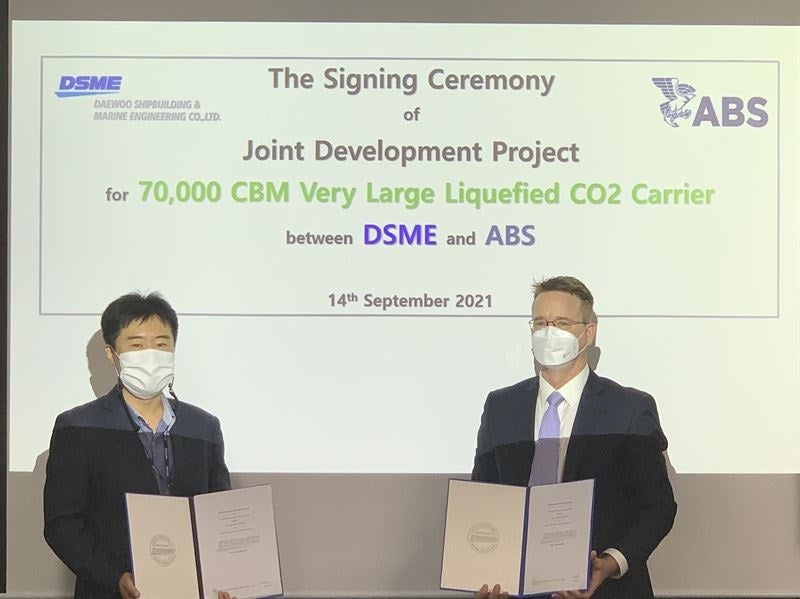
The American Bureau of Shipping (ABS) and Daewoo Shipbuilding and Marine Engineering (DSME) have teamed up to develop designs for a 70,000 CBM very large, liquefied CO₂ (LCO₂) carrier.
This joint development project (JDP) will involve the development of carbon capture utilisation and storage (CCUS) technology that will eventually require bigger ships for CO₂ transport than those currently deployed in the food industry.
ABS global engineering and technology senior vice-president Patrick Ryan said: “CCUS can play a role in reducing emissions in a range of industries, but the supply chain will need vessels capable of transporting CO₂ safely and efficiently.
“That’s why this JDP with DSME is so important, not just for the maritime industry but for ambitions to reduce the carbon footprint of the entire global economy.”
DSME will work on the creation of a new design that will focus on enhancing operational efficiency by increasing tank size.
For expanding the tank capacity, the JDP will analyse the application of numerous steel materials and current low-temperature steel.
How well do you really know your competitors?
Access the most comprehensive Company Profiles on the market, powered by GlobalData. Save hours of research. Gain competitive edge.

Thank you!
Your download email will arrive shortly
Not ready to buy yet? Download a free sample
We are confident about the unique quality of our Company Profiles. However, we want you to make the most beneficial decision for your business, so we offer a free sample that you can download by submitting the below form
By GlobalDataDSME previously worked on the development of a conceptual design of a 100,000 CBM LCO₂ carrier.
These new LCO₂ vessels will be developed in line with the ABS Rules for Building and Classing Marine Vessels as well as the ABS Guide for Liquefied Gas Carriers with Independent Tanks.
They will also comply with the International Code for the Construction and Equipment of Ships Carrying Liquefied Gases in Bulk (IGC Code).
DSME director and ship basic design division head Nuno Kim said: “DSME will maintain its unique competitiveness for the technology and quality in the field of liquefied gas carriers, such as liquefied natural gas (LNG) and liquefied petroleum gas (LPG) carriers, through this development of very large LCO₂ carriers.
“And it will be able to maintain an advanced technology in the market of LCO₂ carriers, which is one of the major concerns in the CCUS sector.”
Furthermore, DSME has come up with a technology that can gather and store carbon dioxide produced during ship operation by using ammonia-water absorbent.
This new technology was tested using the exhaust gas purification technology developed by Hi Air Korea.
In a statement, DSME ship design head Lee Sang-cheol said: “We will do our best to speed up commercialisation based on the successful verification of this carbon dioxide capture and storage technology.”
Last month, Mitsui OSK Lines and DSME completed the demonstration trial of the Cryo-Powered Regas system for a floating storage and regasification unit (FSRU).







